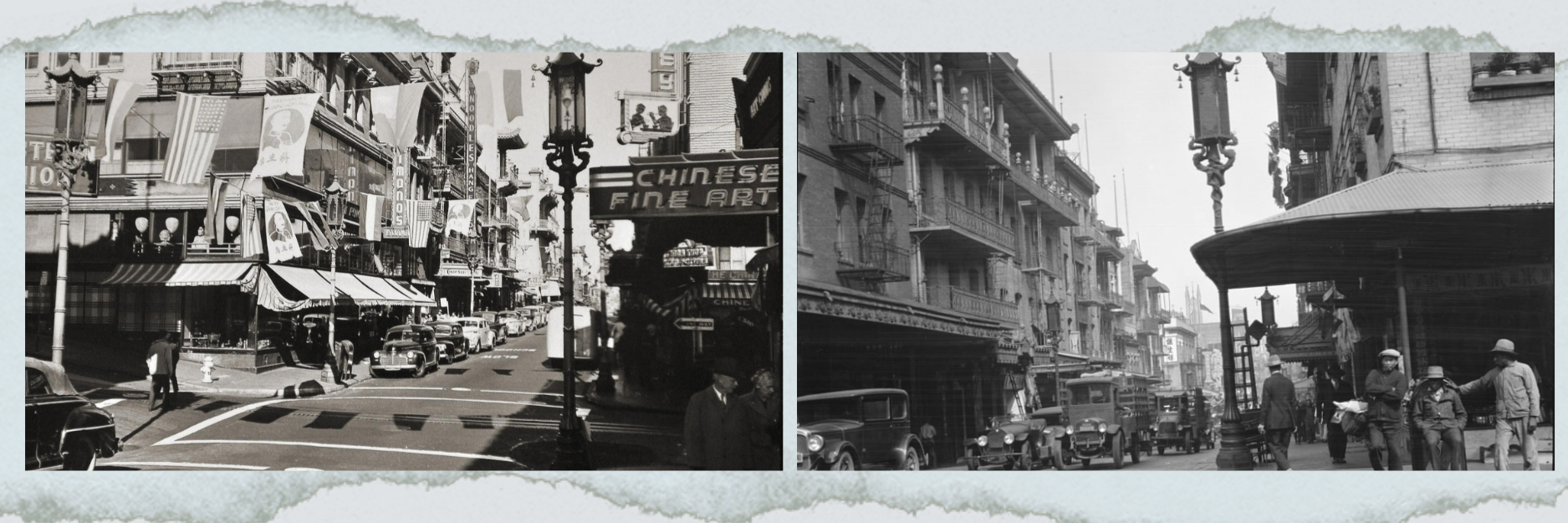James Poy Wong 黃培正

"I wonder if we yellow-race people were to stand in front of white people's restaurant and stared at the fat turkey, what would they think?"
"Chinatown Scenery" - 1944
华埠风光
华埠的脚下高插一座白洋楼,是移民的新地址。 如果不是战争的影响, 恐怕又满装着没有罪过而失却自由的侨胞。啊!好一座望天堂的地狱。 街上往来许多红发绿眼的洋人, 昨天还大骂了一顿华埠的破旧不洁, 有辱了他们的贵市, 今又跑来这里游, 自傲地对外来的朋友说:这是我们三藩市八景之一。
杂货舖前围着一堆洋人,伸长了颈子呆望了半个钟头。 店内的肥大个子振起了精神很快地切着那刚出炉的烧猪。因为前面的观望者给他以过强的兴奋剂, 几乎把自己的手指切了进去。 不知如果我们这辈黄种人 站在白种人的餐馆前望着那肥大的火鸡时, 他们又有什么感想?: “讨钱的流氓.”
街中又围了一堆人, 一个 “唐人” 执着洋人的 “心口”, 预备演一幕 「街头斗争剧」。 旁观者都高呼着: “打佢啦, 唐人” ! 好像这样就出尽了 “洋人气” 似的。
有些编辑先生写了两首小诗来发写作的牢骚。我现在才知道写作是逝了青春又失了幸福。
夜间将近十二时的时候,几个小孩(不满九岁)慢慢地从大戏院向华埠回来。
挽着面包箱的老妇, 一寸寸地走着, 几乎连身体也支持不住。 但是为了爱国心的驱使,也愿意跑到船厂来做工, 好像船厂负了她的债, 现在回去收一样。
街上的水兵尽向行人询问 “野鸡” 的所在 —— 一个民族的侮辱。
餐馆里, 一派上流人物对妇女们 “妈妈声” 谈笑。
报馆的窗前,站着两个 “亚伯”, 握了两枝烟斗, 长吁短叹地高谈着战争。
走进一条横巷,突然从货仓里抛出一只死老鼠来。
Chinatown Scenery
A white building sticking up high outside the foot of Chinatown is the new location of the Immigration Bureau. If it was not due to the impact of war, I am afraid it would be full of my countrymen who are innocent yet lost their freedom. Ah! What a great hell staring into heaven.
There are many red-haired and blue-eyed foreigners on the street. It was just yesterday that they cursed the dilapidated and filthy Chinatown disgracing their noble city, and today they come touring here and proudly tell their friends coming from other places: this is one of the eight scenic spots of San Francisco.
A bunch of foreigners gather in front of a grocery store, stretching their necks in awe for half an hour. Exerting himself in spirit, the big-fat store clerk swiftly chops away the roast pork fresh from the oven. Because he is overly stimulated by the spectators at the store front, he nearly chops his own fingers into the meat. I wonder if we yellow-race people were to stand in front of white people's restaurant and stared at the fat turkey, what would they think?"Begging hoodlums"?
Another mass of people forms a circle. Within it a Tang-Man grabs on the chest of a foreigner, preparing to play a dramatic scene of "Street-Corner Fighting." Bystanders yell out, "Hit him, Tang-Man!"1 — as if doing so will fully avenge their anger against the foreigners.
An editor has once written two poems to vent his grievance in writing. Only now have I realized writing leads to passing of youth and loss of happiness.
It was approaching midnight and a few kids (not even nine years old) slowly returned to Chinatown from the theater downtown.
Carrying a sandwich box an old lady walks in inch-steps, seemingly unable to support her body. Yet driven by the love of the country, she is willing to work in a shipyard as if it has owed her and she is coming to collect the debt.
The sailors on the street keep asking passersby where the prostitutes are - a disgrace to an ethnic people.
In a restaurant a group from the upper circle uses foul language and talks cheerfully in the presence of their female company.
In front of the window of a newspaper office stand, two old "uncles” carrying smoking pipes, sighing and lamenting as they loudly discuss the war events.
Entering into an alley - suddenly- a dead rat is tossed out from a warehouse.